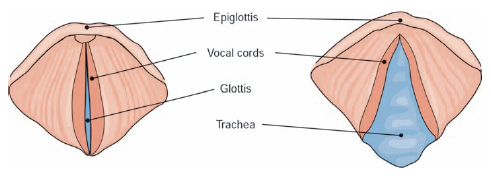Digestive SystemUpper Gastrointestinal Tract |
What are the actions of swallowing? |
Swallowing, also called deglutition, involves both voluntary action and involuntary action. During the voluntary phase, the bolus is pushed to the back of the mouth by the tongue. The pressure of the bolus on the pharynx activates the swallowing center in the brain. Four steps then occur in rapid succession for the bolus to enter the esophagus.
The tongue moves to the roof of the mouth (the hard palate) to prevent food from re-entering the oral cavity.
The uvula (the flap of skin at the back of the mouth) moves upward to block the nasal passages.
The vocal chords close over the opening of the windpipe or glottis.
As the bolus passes into the esophagus, the epiglottis (a flap of cartilaginous tissue) closes over the glottis to ensure food does not enter the respiratory system.

